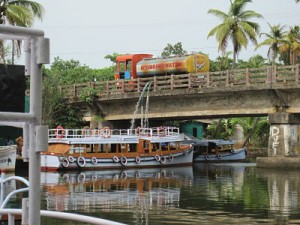
Water is a human right. In July this year, the United Nations declared that “Safe and clean drinking water and sanitation is a human right essential to the full enjoyment of life and all other human rights”. Not something most of us want to think about on holiday, really. However, with water so very central to tourism, and tourism so very central to world economies, the two are inextricably linked.
Indeed, our water footprint as tourists is something that we will be hearing more and more about as temperatures continue to rise around the world. Especially in those winter sun destinations we all crave. Here are some of the unfathomable facts:1.1 billion people worldwide have no access to clean water; 1.4 million children die each year because of unsafe water; in parts of Asia and Africa, women carry water weighing as much as your carry on luggage on their heads ever day just for basic needs. And the hardest fact for holiday makers to face is that this is often happening just a few kilometres away from a tourism resort with shimmering infinity pools sourced from precious ground water.
The Stockholm International Water Institute (siwi.org) states that “The world’s water crisis is not related to the physical availability of water, but to unbalanced power relations, poverty and related inequalities”. Leading sustainable tourism charity, Tourism Concern agrees, lobbying for an end to water inequity, and highlighting problem areas. Such as Kovalam, Kerala, in southern Indian which, like so many in Kerala and Tamil Nadu, was transformed from quiet fishing village to uncontrolled tourism building site within a couple of decades. As tourism became on trend, fishing families were forced to leave not only so they could find beaches where they could fish freely, but also to find new homes. This displacement was left unmanaged, leading to an excess of pit latrines in their new villages, which contaminate already short supplies of ground water. Ground water which gently sprinkles neighbouring golf courses.
Daily drinking water is now brought to these villages by privately run tankers which local people have to buy. The same goes for tourism destinations in Africa, The Caribbean, Mexico, to name but a few, but also closer to home, such as Greece, Malta and Spain, where water has been shipped in containers in recent years to supplement supplies. In Bali, a tourist can use between 750-1500 litres of water a day, depending on how many pools, golf courses and gardens there are on offer, or how many showers are had by each individual. Down the road, however, women are still walking several kilometres every day to get one bucketful of water for their families.
Providing water for the world is central to all the Millenium Development Goals which are to be met by international leaders by 2015 (un.org/millenniumgoals). However, beyond a ‘polite request’ to save bathroom towels, or a low pressure flush in the loo, I don’t see many of tourism’s leaders taking serious action to deal with this crisis. There is plenty that we can do on our travels to limit water use, but understanding the issues is a good starting point, and making your tour operator aware that you are concerned about them is another. If you see villagers carrying buckets of water, then raise it at management level not just at the hotel reception. Often businesses do nothing until their clients start to shout about it. And sadly, many governments do nothing until international companies start shouting too, in response to their clients’ demands.
You can also choose a tour operator which has a clearly defined responsible tourism policy, but this is not just an issue just for ecotourism specialists anymore. The mass tourism industry needs to act and we are all part of that mass. If you are travelling independently, however, it is worthwhile referring to Tourism Concern’s Ethical Travel Guide (tourismconcern.org.uk) as they work closely with community-run organisations worldwide, such as Kabani (kabani.org) in Kerala which are switched on to the problems.
Saving water on holiday is not just the right thing to do; it is supporting a human right. When the United Nations launched an International Decade for Action called “Water for Life 2005-2015“ the former UN Secretary-General Kofi Annan said. “This is an urgent matter for human development and human dignity. Together we can provide safe, clean water to all the world’s people……together we must manage them better”.
An edited version of this article, by Catherine Mack, was first published in The Irish Times, 11 September 2010
